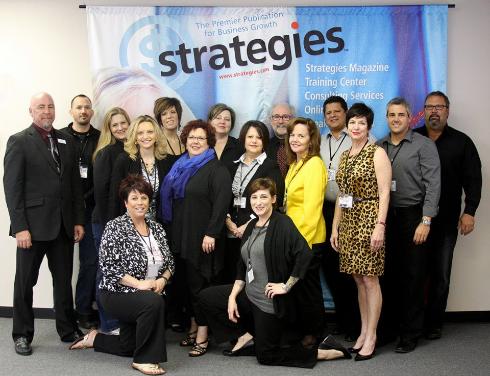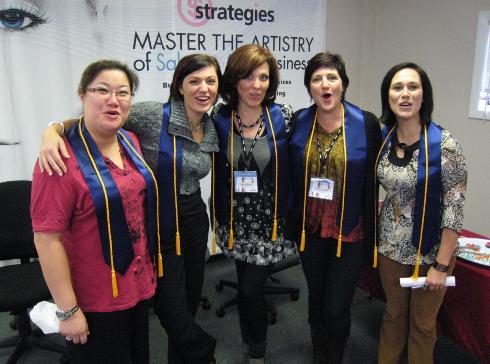click image to zoom  Neil Ducoff proudly wears a Strategies 20th Anniversary T-Shirt. HOLDING TRUE TO HIS “NO-COMPROMISE” MANTRA, STRATEGIES’ NEIL DUCOFF CELEBRATES HIS 20TH YEAR OF GIVING SALON OWNERS A BUSINESS WAKE-UP CALL.
Neil Ducoff proudly wears a Strategies 20th Anniversary T-Shirt. HOLDING TRUE TO HIS “NO-COMPROMISE” MANTRA, STRATEGIES’ NEIL DUCOFF CELEBRATES HIS 20TH YEAR OF GIVING SALON OWNERS A BUSINESS WAKE-UP CALL.
Since 1993 Strategies has held true to a single mission: to assist businesses operate more efficiently and profitably. The corporate has worked with thousands of salon/spa/medspa owners, managers and their teams to create businesses that balance profitability with a contented work environment and devoted customers.
“Strategies is a living, breathing entity that tells you in case your company is performing correctly and functioning properly. It’s designed to construct strong, vibrant, healthy companies,” says Neil Ducoff, founder. “Our mission is to empower our clients to be the foremost successful they are often by teaching best practices that bring about tangible improvements in each of our four business outcomes: profitability, productivity, staff retention and customer loyalty.”
Led by Ducoff, Strategies has a team of coaches and educators who perform seminars, on-site training, coaching services and webinars to clients nationwide; offering them the chance to streamline and improve their systems, and most of all to grow their profitability.
“Sometimes after starting a corporation, it doesn’t always prove like the way you intended,” says Ducoff. “If you’re strong, then yes, you and your service providers can grow together; but when you aren’t, then that’s where Strategies let you come again on track.”
This year is a different year for Strategies—marking its 20th anniversary serving the salon industry. The corporate recently held open-invitation events in Austin, Texas, Lake Zurich, Illinois and at its Business Academy in Centerbrook, Connecticut. Attendees shared their success stories and tuned right into a live streaming session from Ducoff thanking everyone who has touched Strategies somehow or another during the last twenty years.
“It’s amazing how memories come rushing back at these milestones. And that’s exactly how I view our 20th anniversary—it’s a milestone. It’s a time to appear back on the accomplishments, enlightenments, wins, losses, and naturally the teachings we learn along the manner.”
SALON TODAY recently interviewed the “master of industrial,” and Ducoff shared many of the wisdom he’s gained about salon ownership, entrepreneurism, and the pro beauty industry, as he built his own company.
What gave you the assumption to begin Strategies?
Ducoff: “As far back as i will remember, I’ve had a zeal for understanding how business works, what it truly means to be a pacesetter, and a burning want to teach and enlighten others. I knew I wasn’t going to be an international famous hair stylist, so i began Strategies to create the best job that may allow me to succeed in my full potential by feeding the passions that drive me. It’s been one hell of a ride and, in order that we’re all clear, my ride is much from over. There are some more books to write down, classes to coach, and more leaders to teach.”
click image to zoom  SALON TODAY attended a different Salon Today 200 Strategies Incubator.
SALON TODAY attended a different Salon Today 200 Strategies Incubator.
How did you’re making your dream a reality?
Ducoff: “I decided to begin my very own business publication, called Strategies. We did the 1st issue in January 1994—it was 16 pages and not using a advertising. I loved my little magazine, it was really fun to work on and it contained an efficient dose of economic information. After the publication started gaining in popularity, we started our first two-day class in June 1994, after which within the fall we started our famed Incubator seminar.
“That’s when our company started evolving. Strategies became an education company, and the classes grew in popularity. Through the years, because the internet grew, Strategies the magazine became impractical as more people were in search of information online. In December 2007, we finally decided to close down the magazine, it was a tricky decision to make. But with every end there’s a new beginning, and that led us to our first Monday Morning Wake-Up (MMWU)! These e-newsletters are free, full of tips and advice, with a circulation of more than 10,000.”
What can a salon owner expect from one of Strategies’ famed Incubator sessions?
Ducoff: “Incubator’s four days begin with a heavy dose of no-compromise leadership and dives right into creating balance across the Four Business Outcomes: profitability, productivity, customer loyalty and staff retention. Classes cover culture building, client retention and power growth systems—a dynamic salon/spa/medspa business model will be presented to all. Owners learn how to make positive changes in their businesses right away to start building a rock-solid foundation. They learn how to read, understand and control their company’s numeric ‘vital signs.’ Your company can’t be financially strong if you don’t know what your numbers mean and what you need to do to improve your cash-flow reality. Attendees also learn why their compensation system matters and how team-based pay changes everything in their business, including performance, payroll costs, growth and culture, plus more.”
What does it take to be a Strategies coach?
Ducoff: “Strategies’ coaching team is a group of exceptional business professionals who were either former salon owners or are active salon owners with multiple locations. Unlike coaching franchises where all it takes to become a coach is the ability to pay the fee, each Strategies coach must complete an extensive three-year training program, during which they must demonstrate their command for business by opening up their own companies to close monitoring and coaching by Strategies. And that’s what makes Strategies coaches unique: They are all business owners and each of them experiences the same challenges that any owner faces every day.”
Your role offers you a unique vantage point. How has the professional salon industry changed over the past 20 years?
Ducoff: “I am really surprised how much the booth rental/independent contractor business has grown. Products and distribution have grown to accommodate the independent contractor. Because of the growth in this category, lots of independent salon owners have told me they are very wary about investing in people.
“The fact is you will always have people that will stay and then leave, or take their business down the street. You just have to be savvier as an owner, and as a company to retain people. Owners need to prepare themselves and seek out the right education to build their companies in order to compete in this very different climate. People have the choice to rent a chair or stay in a salon. It’s the difference between having a team around you or competitors around you.
“On the manufacturer side, I have noticed they are becoming more protective of their networks. Large manufacturers have their own communities, their own events. The flow of information becomes difficult with this kind of structure, and the salons sometimes become sheltered with what else is occurring in the industry.
“We service a lot of manufacturer customers. Yes, they want stronger businesses, but are the salons really getting all of the business education they need? Are they creating the businesses that are going to sustain the manufacturer long-term?”
click image to zoom  Neil Ducoff lifting them higher at the Strategies Business Academy in Centerbrook, CT
Neil Ducoff lifting them higher at the Strategies Business Academy in Centerbrook, CT
What are some common business mistakes salon owners make?
Ducoff: “There are three primary areas that owner mistakes fall into:
Not paying attention to the numbers. A salon’s financial reports are a numeric readout of its vital signs with respect to performance and health. Too many owners don’t understand the reports and, therefore, are unable to read the warning signs. Even fewer owners practice the discipline of building and living a cash-flow plan that projects monthly revenues and anticipated expenses. Over the years, I’ve seen countless owners fall into one cash-flow crisis after another and run up scary amounts of credit card debt in the process. The financial stress is unbearable and takes a toll on owners and their families. With the right training, coaching and systems, these situations are most curable. Owners must make peace with their numbers and learn how to take control of them.
Growing individuals not companies. For years, salons have been stuck in this ‘grow the individual’ thinking. All their systems are focused on growing the individual. It’s about building an individual’s request rate. It’s driving individual sales, increasing individual prices when their column gets booked up, hiring them an assistant to spin more money out of their two hands and one chair. This approach creates customer loyalty to individuals while compromising the brand and security of the company. It’s no wonder salons fear walkouts or why stylists see chair rental as their next opportunity. Growing a salon is about growing a company. It’s about building a dynamic culture where all employees work collectively to drive the right outcomes. It’s about building a brand and customer loyalty to the company. If you ever had a walkout—you know exactly what I’m talking about. It’s time to change your focus and your systems. No compromise!
Walking on eggshells. The best companies, salons included, are structured, systematized and adaptable to change. But so many owners fear change and the push-back from stylists. ‘They’ll never go for this,’ is what I so often hear…even when suggesting simple changes. I’m not about ‘my way or the highway’ leadership because that does more to destroy salon cultures than build them. Call it ‘hostage management’ or whatever you like, but not acknowledging that issues need to be addressed and doing nothing is where so many owners get into trouble.”
Where do owners compromise their businesses?
Ducoff: “I wish there was an easier way to say this, but owners compromise by getting too comfortable with ‘average’ performance. Owners may talk about getting to that elusive ‘next level,’ but getting there demands leadership, a plan, commitment, discipline and accountability.
“If your retail sales are stuck at +/- 10 percent of revenue, that’s average. If your pre-book ratio is below 40 percent, that’s average. If first-time client retention rate is below 45 percent, that’s average. If productivity rate is below 70 percent, that’s average.
“I work with a salon in Maryland that has a pre-book ratio of 86 percent. I call that extraordinary. At this salon, pre-booking is a system that everyone is held accountable to.
“When owners continue to accept average performance, that’s all they’ll get. My “No-Compromise Leadership” approach to business is about doing what it takes to grow a great company. In a no-compromise company, average anything sticks out like a red warning light. If your salon is more of a country club than a business, it’s time to go no compromise.”
 Fast Forward (published in 2000), is a 485-page business resource for salons, spa and medspas. In 2013, Strategies published a completely revised version called Fast Forward: Second Edition. If you’re an owner or manager, or thinking about becoming one—this is a must-read! No-Compromise Leadership: A Higher Standard of Leadership Thinking and Behavior, was published in 2009, and won the 2010 IPPY Award for Business/Leadership. This book can only be described as Neil Ducoff’s personal manifesto for leadership, business growth and how to create a truly dynamic company culture. Awaken!, published in 2012, is 270-pages of 110 fast-reading strategies designed to motivate, challenge, captivate and spur leaders of all levels to greater success and ease of operations. The articles may be brief, but they’re long on information, featuring Neil’s no-holds-barred wisdom. When and why did you begin to focus on compensation, and what exactly is team-based pay?
Fast Forward (published in 2000), is a 485-page business resource for salons, spa and medspas. In 2013, Strategies published a completely revised version called Fast Forward: Second Edition. If you’re an owner or manager, or thinking about becoming one—this is a must-read! No-Compromise Leadership: A Higher Standard of Leadership Thinking and Behavior, was published in 2009, and won the 2010 IPPY Award for Business/Leadership. This book can only be described as Neil Ducoff’s personal manifesto for leadership, business growth and how to create a truly dynamic company culture. Awaken!, published in 2012, is 270-pages of 110 fast-reading strategies designed to motivate, challenge, captivate and spur leaders of all levels to greater success and ease of operations. The articles may be brief, but they’re long on information, featuring Neil’s no-holds-barred wisdom. When and why did you begin to focus on compensation, and what exactly is team-based pay?
Ducoff: “Few people know this, but in the early ’70s I was a stylist and owned two salons in New Jersey. I was busy behind the chair and did everything I could to encourage my clients to experience the other fine stylists that worked for me. My thinking was ‘wide.’ It really bothered me how my stylists, especially the really busy ones, seldom if ever encouraged ‘their’ clients to experience other stylists. At the time, we tracked request rates and paid commission. Combined, those two elements created an ‘I/me/mine’ mentality. That was not the culture I wanted in my company.
“I also realized that paying 50-percent commission was not affordable or sustainable. I needed a ‘team-based’ system and a compensation system that gave me control over my company’s payroll percentage. I converted to a very basic team-based, non-commission, system in 1975. Simply put, team-based pay (TBP) is an hourly rate plus team bonus system.
“Unlike commission,where employee’s pay is based on his or her individual sales, TBP is compensation based on the overall performance of the employee in four key areas; performance and critical numbers (first-time client retention rate, pre-book, productivity rate, etc.), skills development (various technical and client handling skills), culture and teamwork (embracing change, support company values, delivers results, etc.), and individual strengths (dependability, accountability, attendance, communication, etc.)
“Owners are attracted to TBP for one or a combination of the following reasons:
Cultural: They seek to build a company culture that instills a “we/us/team” mentality.
Financial: Commission, even with sliding scales, is a fixed percentage of service sales and, therefore, is difficult to change to protect profit when operating costs increase. TBP, because it is an hourly-based pay system, is a controllable cost.
Operational: TBP focuses on driving critical numbers including client retention, pre-book, and productivity rates. TBP engages every team member in the efficient operation of the company and its ability to retain clients.
Employee Growth Paths: TBP removes the income ceiling for top producers inherent with commission. TBP, because it is based on managing the company’s payroll percentage and driving growth, offers manageable income growth for continued superior performance. Service providers are very motivated to perform on TBP— as long as the necessary support systems are in place.”
What new initiatives is Strategies working on now?
Ducoff: “We are starting a membership program (strategies.com/memberships). We try to find easy ways to help people who are doing business with us. Now instead of salon owners second guessing their next step, they can experience a comprehensive suite of personalized Strategies coaching, seminars, on-site training and webinars.
“We are also partnering with Wella to help some of their salons in need. We are now getting Wella sales consultants sitting next to Wella salon owners and asking Strategies what their next step is. Wella is certainly giving us the exposure, but they also want their salons to grow.
“We are having the best year we have ever had. We are 47 percent ahead from last year. People are seeking us out, and wanting to grow their businesses to the next level.”
Where do you think Strategies may be in twenty years?
Ducoff: “Some day this company is going to be owned by the people who work for it and are passionate about it, and there will be a transition in leadership. I can see us getting into other markets. There’s a lot of opportunity for us inside the med/spa world, so we will probably advance in that category. But most of all, I think in 20 years from now salons will still be needing help, and we will still be there for them.”
click image to zoom  Strategies’ Neil Ducoff and Certified Strategies Coach Daryl Jenkins teach a class of Salon Today 200 winning salons.
Strategies’ Neil Ducoff and Certified Strategies Coach Daryl Jenkins teach a class of Salon Today 200 winning salons.
click image to zoom  Learning numbers and a loving every minute of it on the Strategies Business Academy in Centerbrook, CT
Learning numbers and a loving every minute of it on the Strategies Business Academy in Centerbrook, CT
click image to zoom  L-R Leslie Rice (Certified Strategies Coach), Michael Yost (Certified Strategies Coach), Kim DeLisa, Jennifer Bobal & Neil Ducoff. No-Compromise Leadership and Outstanding Performance award presentation at Strategies Mastery Course.
L-R Leslie Rice (Certified Strategies Coach), Michael Yost (Certified Strategies Coach), Kim DeLisa, Jennifer Bobal & Neil Ducoff. No-Compromise Leadership and Outstanding Performance award presentation at Strategies Mastery Course.
click image to zoom 


